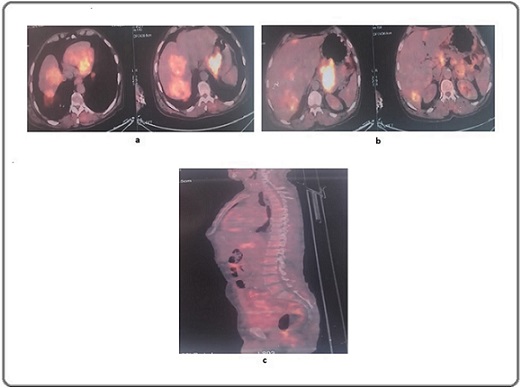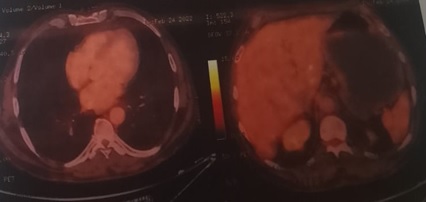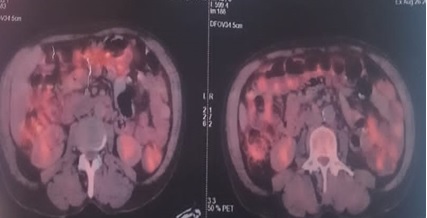Current Role of Chemotherapy in Metastatic Carcinoma Stomach- A Case Presentation and Review of Literature on Chemotherapy
Download
Abstract
Introduction and Importance: Systemic therapy can provide palliation, improved survival, and enhanced quality of life in patients with locally advanced or metastatic gastric cancer. First-line systemic therapy regimens with two cytotoxic drugs are preferred for patients with advanced disease because of their lower toxicity. The use of three cytotoxic drugs in a regimen should be reserved for medically fit patients with excellent performance status and easy access to frequent toxicity evaluations. But we are presenting a rare case report of 60 year old patient diagnosed with metastatic gastric carcinoma who showed long term complete response with single agent capecitabine based therapy which is a matter of contemplation in the current era.
Case Presentation: 60 year old gentleman with ECOG 2 presented with complaints of loss of apetite and loss of weight from last 6 months.Clinical Findings and Investigations: Upper gastointestinal endoscopy of gastric mass was undertaken which revealed ulceroproliferative gastric growth and subsequently, gastic growth biopsy was done which on histopathology report revealed moderately differentiated gastric adenocarcinoma.
Interventions and Outcome: For staging the disease, Whole body PET-CT scan was performed which showed FDG avid gastric lesion with multiple, bilobar liver metastasis and bulky retroperitoneal lymphadenopathy. All routine blood investigations were done simultaneously.Patient was counseled for ultrasound guided biopsy of liver lesions in Aug 2021. (Figure 1a, 1b, 1c) which showed metastatic deposits. We offered him to get IHC testing of biopsy sample for Her-2-neu, MSI testing and patient had Her2-neu negative disease. He was initiated on CAPOX dual agent regimen with tablet capecitabine 1000mg twice daily from day 1-14 cycled every 21 days and Injection oxaliplatin (Day 1) with dose of 130mg/m2 and repeated every 21 days for 8 cycles. He tolerated the chemotherapy well with improvement of general condition and showed partial response to treatment on whole body PET-CT scan (Figure 2) Case was discussed in multidisciplinary tumor board for further course of management and the plan to initiate tablet capecitabine monotherapy with 1000mg twice daily from day 1-14 cycled every 21 days was made as it was freely available in our tertiary cancer centre along with the nutritional support with enteral high protein diet. He was advised to remain on close follow up and after 1 month, he showed further improvement in symptoms with improved appetite and weight gain. Same cycles of capecitabine were continued and repeat whole body PET-CT scan was done at 6 months interval which showed no FDG avidity in the body. He is on same regimen till date and last repeat PET-CT scan was done in April 2024 which again showed complete response to treatment (Figure 3).
Relevance and Impact: For patients with metastatic gastric carcinoma, performance status determines the type of therapy and treatment. Also IHC markers aids in the decision making in the type of therapy to be offered to the patient. Lastly, in low resource settings, metronomics in the form of capecitabine therapy assists in the control of this subset of the disease.
Introduction
Systemic therapy can provide palliation, improved survival, and enhanced quality of life in patients with locally advanced or metastatic gastric cancer [1-2]. First-line systemic therapy regimens with two cytotoxic drugs are preferred for patients with advanced disease because of their lower toxicity [3-5]. The use of three cytotoxic drugs in a regimen should be reserved for medically fit patients with excellent performance status and easy access to frequent toxicity evaluations [6]. But we hereby present a rare case report of 60 year old patient diagnosed with metastatic gastric carcinoma who showed long term complete response of nearly 2 years with single agent capecitabine which is a matter of contemplation in the current era. Also in a resource constraint settings, patients could be offered only capecitabine therapy to better understand the biology of the tumor. Further prospective trials are required to evaluate the efficacy of capecitabine monotherapy in metastatic gastric cancer with respect to improved disease free survival and response rate.
Patient Information
60 year old gentleman presented to our clinic with complaints of loss of apetite and loss of weight from last 6 months. He had no relevant past medical and surgical history. He had no relevant family history of cancer. Also he had no history of any drug allergy. He quit smoking 5 years back,occasional alcoholic and was non-vegetarian. On examination, he has ECOG 2 with no abdominal lump palpable. Rest of systemic examination was normal. Gastoenterology reference was made and patient underwent upper gastointestinal endoscopy which revealed ulceroproliferative gastric growth and subsequently, gastic growth biopsy was done which on histopathology report revealed moderately differentiated gastric adenocarcinoma. For staging the disease, Whole body PET-CT scan was performed which showed FDG avid gastric lesion with multiple,bilobar liver metastasis and bulky retroperitoneal lymphadenopathy. All routine blood investigations were done simultaneously. Patient was counseled for ultrasound guided biopsy of liver lesions in Aug 2021 (Figure 1a, 1b, 1c).
Figure 1. 1a, 1b, 1c. Whole Body PET-CT Scan- Presence of FDG Avid Bilobar Liver Lesions, Gastric Growth and Bulky Retroperitoneal Lymphadenopathy. (August 2021).

which showed metastatic deposits. We offered him to get IHC testing over tumor sample for Her-2-neu, MSI testing and patient had Her2-neu negative disease.
Intervention
Nutritional support was given by ryles’s tube placed during upper gastrointestinal endoscopy procedure and high protein diet was initiated by our nutritionist. Case was discussed in multidisciplinary tumor board and he was initiated on CAPOX dual agent regimen (August 2021) with tablet capecitabine 1000mg twice daily from day 1-14 cycled every 21 days and Injection oxaliplatin (Day 1) with dose of 130mg/m2 and repeated every 21 days for 8 cycles. He tolerated the chemotherapy well with some side effects of nausea and vomiting which were managed conservatively. His general condition improved and in February 2022, repeat whole body PET-CT scan was done which revealed partial response to treatment (Figure 2).
Figure 2. PET-CT Scan Showing Partial Response to Therapy (February 2022).

Case was again discussed in multidisciplinary tumor board for further course of management. The plan to initiate tablet capecitabine monotherapy with 1000mg twice daily from day 1-14 cycled every 21 days was made as it was freely available in our tertiary cancer centre and patient had financial constraints.
Nutritional support was continued and he was started with tablet capecitabine 1000mg twice daily from day 1-14 cycled every 21 days. He was advised to remain on close follow up and after 1 month, he showed further improvement in symptoms with improved appetite and weight gain. Same cycles of capecitabine were continued and repeat whole body PET-CT scan was done at 6 months interval which showed no FDG avidity in the body. He remained on regular follow up and on same regimen till date with last repeat PET-CT scan done in April 2024 which again showed complete response to treatment (Figure 3).
Figure 3. PET-CT Scan Showing no FDG Avidity in Liver, Stomach or Retroperitoneal Region with Complete response to Capecitabine Monotherapy( April 2024).

Discussion
The patients with metastatic gastric cancer has dismal prognosis. Management of unresectable or metastatic disease include either systemic therapy and/ or chemoradiation, with the goal of providing symptom relief and delaying the progression of disease, with the incorporation of symptom-directed best supportive care. The decision to offer palliative/best supportive care alone or with systemic therapy is dependent upon the patient’s performance status [7]. Various studies have shown the survival benefits with systemic therapy as compared to palliative/best supportive care alone for patients with advanced gastric cancer [1-2]. With the addition of systemic therapy,advantage of improved quality of life and prolonged survival has been observed in patients with advanced gastric cancer. The standard treatment for metastatic gastric cancer is systemic therapy regimens with two cytotoxic drugs due to their lower toxicity [3-5]. Three cytotoxic drugs regimen should be reserved for medically fit patients with excellent performance status and patient compliance [6]. Oxaliplatin is generally preferred over cisplatin due to its lower toxicity. Trastuzumab should be added to first-line chemotherapy for patients with HER2 overexpression-positive adenocarcinoma (combination with a fluoropyrimidine and a platinum agent) is preferred [8]. But the preferred regimens for HER2-negative disease also include a fluoropyrimidine (fluorouracil or capecitabine) combined with either oxaliplatin or cisplatin [4-5, 9-12]. But toxicity is more with fluorouracil plus cisplatin and may not be suitable in older adult patients.Studies have shown the efficacy of combined capecitabine and cisplatin (XP) compared to fluorouracil and cisplatin (FP) to be noninferior in patients with advanced gastric cancer [5]. Also studies have shown capecitabine in combination with oxaliplatin to be active and well-tolerated as first-line therapy for advanced gastric cancer [9-10]. Furthermore, results of a meta-analysis suggest that overall survival was superior in advanced gastric cancer patients treated with capecitabine-based combinations compared to patients treated with fluorouracil-based combinations, although no significant difference in progression free survival between treatment groups was seen [11]. While other studies reported that treatment with oxaliplatin-based regimens significantly improved the partial response rate, disease progression rate, and 1-year overall survival rate of patients with gastric cancer as compared to cisplatin-based regimens [12]. Therefore, capecitabine and oxaliplatin is a preferred regimen for first line treatment of patients with advanced gastric cancers. The three drug cytotoxic agent regimen with the addition of docetaxel to cisplatin and 5-FU significantly improved time to progression, overall survival, and overall response rate but are associated with increased toxicities including myelosuppression and infectious complications making it unsuitable for elderly frail patients and patients with poor performance status [6].
In our case report,patient presented with metastatic gastric cancer with Her-2-neu negative disease. Furthermore, he was not fit enough to tolerate three drug regimen. So we initiated two drug regimen with capecitabine and oxaliplatin an a standard dose and cycles which patient tolerated well. He showed improvement in symptoms with better oral intake and weight gain as well as partial response to therapy as shown on whole body PET-CT scan. Furthermore, patient remained on complete remission based on capecitabine monotherapy from nearly 2 years. Our case report is unique as no randomized control trial has shown long term complete response of 2 years with capecitabine monotherapy. Also in a resource constraint settings, patients could be offered only capecitabine therapy to better understand the biology of the tumor. Further prospective trials are required to evaluate the efficacy of capecitabine monotherapy in metastatic gastric cancer with respect to improved disease free survival and response rate.
Acknowlegements
None.
Declaration Informed Consent
Taken from the patient
Additional information
Study has been done with ethical standards
Funding
No funds, grants, or other support was received
Conflict of Interest
None
Financial interests
The authors have no relevant financial or non-financial
interests to disclose.
Ethics Approval
Ethical approval was waived by the local Ethics Committee as it is part of routine care.
Consent for publication
Not applicable
References
- Randomized comparison between chemotherapy plus best supportive care with best supportive care in advanced gastric cancer Glimelius B., Ekström K., Hoffman K., Graf W., Sjödén P. O., Haglund U., Svensson C., et al . Annals of Oncology: Official Journal of the European Society for Medical Oncology.1997;8(2). CrossRef
- Salvage chemotherapy for pretreated gastric cancer: a randomized phase III trial comparing chemotherapy plus best supportive care with best supportive care alone Kang JH , Lee SI , Lim DH , Park K, Oh SY , Kwon H, Hwang IG , et al . Journal of Clinical Oncology: Official Journal of the American Society of Clinical Oncology.2012;30(13). CrossRef
- Phase III trial in metastatic gastroesophageal adenocarcinoma with fluorouracil, leucovorin plus either oxaliplatin or cisplatin: a study of the Arbeitsgemeinschaft Internistische Onkologie Al-Batran S, Hartmann JT , Probst S, Schmalenberg H, Hollerbach S, Hofheinz R, Rethwisch V, et al . Journal of Clinical Oncology: Official Journal of the American Society of Clinical Oncology.2008;26(9). CrossRef
- A randomized phase II trial of S-1-oxaliplatin versus capecitabine-oxaliplatin in advanced gastric cancer Kim GM , Jeung H, Rha SY , Kim HS , Jung I, Nam BH , Lee KH , Chung HC . European Journal of Cancer (Oxford, England: 1990).2012;48(4). CrossRef
- Capecitabine/cisplatin versus 5-fluorouracil/cisplatin as first-line therapy in patients with advanced gastric cancer: a randomised phase III noninferiority trial Kang Y.-K., Kang W.-K., Shin D.-B., Chen J., Xiong J., Wang J., Lichinitser M., et al . Annals of Oncology: Official Journal of the European Society for Medical Oncology.2009;20(4). CrossRef
- Phase III study of docetaxel and cisplatin plus fluorouracil compared with cisplatin and fluorouracil as first-line therapy for advanced gastric cancer: a report of the V325 Study Group Van Cutsem E, Moiseyenko VM , Tjulandin S, Majlis A, Constenla M, Boni C, Rodrigues A, et al . Journal of Clinical Oncology: Official Journal of the American Society of Clinical Oncology.2006;24(31). CrossRef
- The clinical evaluation of chemotherapeutic agents in cancer. In: MacLeod CM, ed. Evaluation of Chemotherapeutic Agents Karnofsky DA , Burchenal JH . New York Columbia University Press.1949;:199-205.
- Trastuzumab in combination with chemotherapy versus chemotherapy alone for treatment of HER2-positive advanced gastric or gastro-oesophageal junction cancer (ToGA): a phase 3, open-label, randomised controlled trial Bang Y, Van Cutsem E, Feyereislova A, Chung HC , Shen L, Sawaki A, Lordick F, et al . Lancet (London, England).2010;376(9742). CrossRef
- Capecitabine in combination with Oxaliplatin (XELOX) as a first-line therapy for advanced gastric cancer Park YH , Lee J, Ryoo B, Ryu M, Yang SH , Kim BS , Shin DB , et al . Cancer Chemotherapy and Pharmacology.2008;61(4). CrossRef
- Phase II trial of XELOX as first-line treatment for patients with advanced gastric cancer Luo H, Xu R, Wang F, Qiu M, Li Y, Li F, Zhou Z, Chen X. Chemotherapy.2010;56(2). CrossRef
- Meta-analysis of the REAL-2 and ML17032 trials: evaluating capecitabine-based combination chemotherapy and infused 5-fluorouracil-based combination chemotherapy for the treatment of advanced oesophago-gastric cancer Okines A. F. C., Norman A. R., McCloud P., Kang Y.-K., Cunningham D.. Annals of Oncology: Official Journal of the European Society for Medical Oncology.2009;20(9). CrossRef
- Efficacy and safety of oxaliplatin-based regimen versus cisplatin-based regimen in the treatment of gastric cancer: a meta-analysis of randomized controlled trials Wang G, Yang B, Fu Z, Wang X, Zhang Z. International Journal of Clinical Oncology.2019;24(6). CrossRef
License

This work is licensed under a Creative Commons Attribution-NonCommercial 4.0 International License.
Copyright
© Asian Pacific Journal of Cancer Care , 2025
Author Details
How to Cite
- Abstract viewed - 0 times
- PDF (FULL TEXT) downloaded - 0 times
- XML downloaded - 0 times